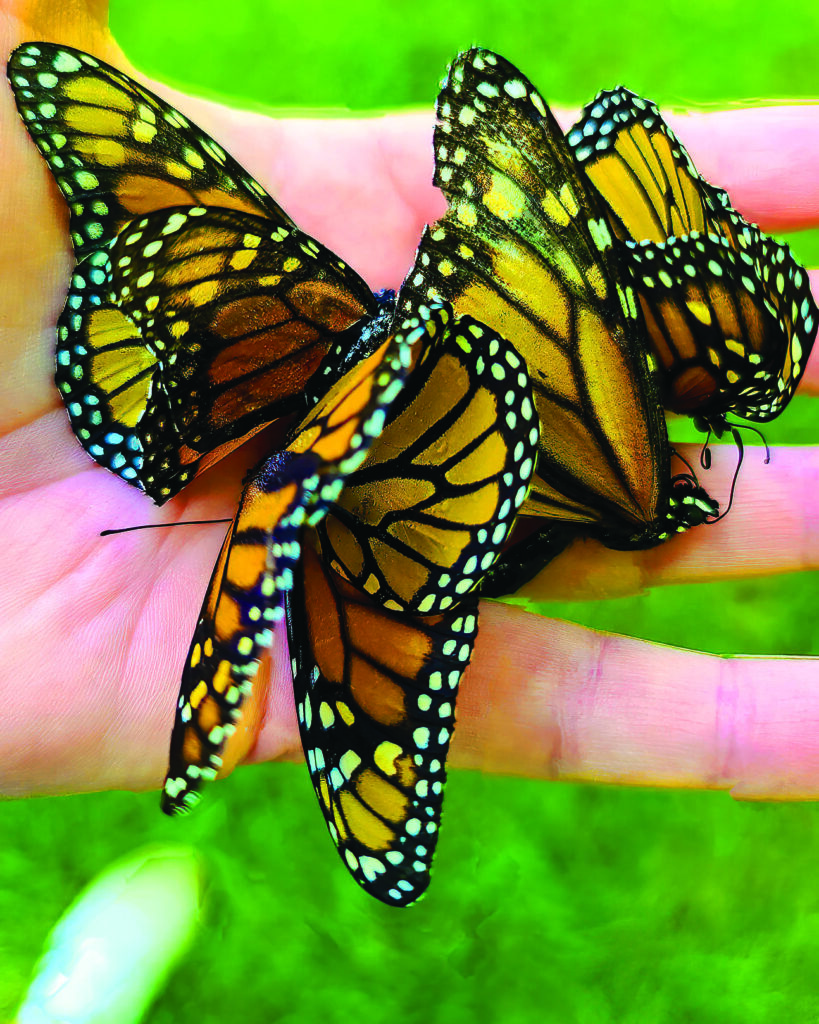
Last August’s death of butterflies after aerial spraying — the so-called “Monarch massacre” — came up as the Moorhead City Council discussed contracting with Cass County Vector Control for this summer and fall. (Photo/Rebekka Haag.)
city council
Nancy Edmonds Hanson
Aerial spraying for mosquitoes has been paused by the Moorhead City Council pending further review – and perhaps establishment of stricter standards for assessing when it will be considered.
The council voted Monday to renew the city’s contract with Cass County Vector Control, which is charged with reducing numbers of the pests throughout Fargo, West Fargo, Horace and Cass as well as the city of Moorhead, with one exception. Action was deferred on aerial application of pesticides until Moorhead Public Works and the council can review when and under what conditions the spraying may be conducted.
Three local residents – Brent Miller, Cheryl Melby and Joseph Allen – raised objections to aerial spraying. Miller pointed out that spraying hurts pollinators, including the cloud of migrating Monarch butterflies that died last August when airborne spraying coincided with their annual migration.
Melby expressed concern about the long-term build-up of chemicals in the environment. “We should be hesitant and cautious. There are other ways to deal with the problem,” she said.
Allen asserted that fears of Culex tarsalis, the species that spreads West Nile virus, are exaggerated. Summertime counts, Allen said, have shown low levels of that species among the 20 or so harmless species that inhabit the area; meanwhile, beneficial pollinators die: “Last August [when the butterflies were killed] the spraying was targeting purely nuisance mosquitoes,” he said.
Council member Steve Lindaas concurred, citing North Dakota research last summer: “While there were large numbers of Culex tarsalis, they were dwarfed by the other species that populate the region. There was no indication of West Nile virus in the natural reservoir,” he reported. “We need more nuanced measures to establish when spraying may be considered.”
Public works director Steve Iverson pointed out that aerial spraying, typically conducted between two and four times in late summer, is only a minor part of CCVC’s campaign against problems insects. “95% of their work is done on the ground,” he said, citing application of chemicals that target larvae in standing water and ground-level fogging for mature insects, which is easier for residents to opt out of or avoid indoors. He also pointed out that the city can opt out of any scheduled aerial flights.
“I can’t think of many things we’ve heard more about than aerial spraying,” Deb White commented. She recommended aerial application only be used with “clear evidence of a public health risk.”
Lindaas added. “Rather than opt out entirely, and if we had a West Nile pandemic, I’ve very sure we could get together to deal with it.”
Chuck Hendrickson sounded the single note of disagreement: “I remember the mosquitoes last August. They were terrible. You couldn’t even go outside.” He noted, too, that after knowing West Nile victims, “it’s a terrible, terrible disease.” His was the only vote against ratifying the full contract.
The board voted 6-1 to approve the contract for 2021 while withholding approval for the aerial portion. Iverson vowed to conduct research on how other cities in the region are dealing with the question; then the council will revisit the possibility of coming up with its own more detailed scale to support more detailed review before saying “yes” to the airborne campaign.

